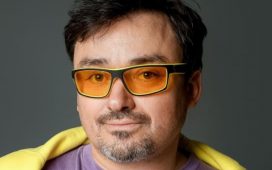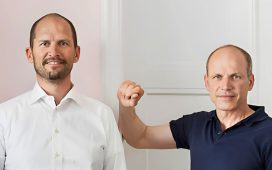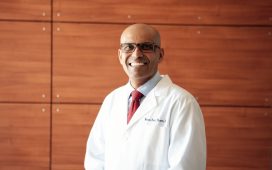Innovation was the flavor of the week at the annual BioMed Israel, an international life-science and health-tech conference, where 150 companies were represented last week at the David InterContinental Hotel in Tel Aviv.
The event’s sizable turnout was particularly noteworthy at a time when Israel is embroiled in conflicts on two borders and many startups are struggling with a lack of personnel and funding.
Even on the third and final day of the event, we saw no shortage of crowds as innovators, investors and other interested parties perused the displays and discussed the latest innovations between startup presentations and keynotes from industry executives, researchers and investors at each of the conference’s 18 sessions.

For 22 years, BioMed Israel has served as a key networking venue for healthcare professionals from around the world, fostering business opportunities and partnerships. Co-chaired by Ruti Alon, Ora Dar and Dr. Nissim Darvish, the conference aims to drive innovations shaping the future of healthcare — a goal that is particularly challenging to achieve in Israel considering the ongoing conflict in Gaza.
“This year, with the unrest in our region, I’m especially proud of the conference that we were able to successfully put in place,” said Alon. “In times of uncertainty, our determination to collaborate and aim to solve global unmet needs in healthcare serves as a beacon of hope and becomes our greatest strength.”
Sessions covered diverse topics such as cancer therapeutics, women’s health, drug discovery, healthy aging, genetic medicine, neurology, cardiovascular diseases, digital biomarkers, diagnostics, medical devices, nutri-tech, bioconvergence and more.

A bustling startup pavilion highlighted 40 young companies and their cutting-edge innovations.
Unsurprisingly, artificial intelligence was a common thread that traced its way through a majority of the startups on display at the event in a wide array of applications. This comes as no surprise, as AI has found its way into seemingly every startup in the country in one capacity or another.
Here’s a look at 13 med-tech startups making waves at this year’s event:
Ramat Gan-based AISAP, founded in 2022, is developing a platform that provides AI-powered point-of-care ultrasound diagnosis. The platform provides real-time guidance and multi-organ diagnoses, enabling immediate and efficient treatment at the bedside.
AIVF, founded in 2018 and based in Tel Aviv, is transforming in vitro fertilization (IVF) through AI technology to boost the capabilities of human embryologists. The platform enhances the efficiency and accessibility of IVF aiming to improve outcomes for patients, clinics and labs.
AlonBio is an oncology biotechnology company in Ness Tziona committed to discovering and developing targeted cancer therapies. By identifying key drivers of cancer cell growth, resistance and survival, the company aims to tackle difficult-to-treat aggressive cancers. AlonBio was founded in 2021.

Avertto, based in Aderet, was founded in 2019 and has developed an early stroke-detection system using wearable or implanted sensors on the carotid artery to monitor blood flow to the brain in real time. Using AI-powered alerts, the system analyzes stroke probability by detecting deviations from baseline activity, ideally detecting a stroke before any neurons die.
Since its founding in 2017, Curesponse of Tel Aviv and London has worked to develop a proprietary platform combining genomic profiling with functional testing of tumors to advance personalized cancer care. Modeling the tumor’s composition and 3D structure allows for accurate treatment effectiveness assessments.
Epilog, founded in 2022, is a chat-based platform focused on improving care for individuals facing serious illnesses. This includes building trusted patient relationships, identifying unmet needs and providing 24/7 support. Epilog’s personalized “companion” aims to help transition patients from disease management to life management, improving their quality of life during critical times. The company is headquartered in Tel Aviv.
Innoventric of Ness Tziona, established in 2016, provides transcatheter solutions — specifically a percutaneous tricuspid valve replacement — for structural heart disease, aiming to enhance the quality of life and longevity for patients with heart disease.
Rehovot-based MetaSight, founded in 2020, develops accurate, affordable and accessible diagnostics for various diseases through a single blood test, aiming to revolutionize disease diagnosis and improve patient outcomes.
Haifa-headquartered Nevia Bio, founded in 2020, uses its technology to enable the early detection of women’s diseases through vaginal secretion analysis. The machine-learning platform targets conditions such as ovarian cancer and endometriosis, empowering women with proactive health management tools.
Pangea Biomed of Tel Aviv, established in 2018, combines molecular biology technology with bioinformatics and machine learning to revolutionize cancer care. Its tumor intelligence platform, ENLIGHT, looks at not just genetic mutations but also changes in gene activity to find how genes interact and identify weaknesses in tumors. By creating “gene social networks,” Pangea Biomed provides insights into tumor vulnerabilities, enhancing personalized treatment options.
QRGenetics, founded in 2019 in Tel Aviv, uses AI-supported drug discovery to rapidly identify novel drug-target combinations. Its process integrates medical and disease data with proprietary algorithms to model diseases and validate discoveries through preclinical and clinical trials.
Quris’ Bio-AI Clinical Prediction Platform predicts which drug candidates will be safe and effective in humans. By testing drugs on miniaturized Patients-on-a-Chip — small chips that house tiny, living tissues and cells — Quris generates data to train its machine-learning models, aiming to reduce the high costs of failed clinical trials and improve the drug development success rate. The four-year-old company is headquartered in Tel Aviv and Boston.
Scala Biodesign of Tel Aviv develops drugs and sustainable manufacturing processes. Its computational platforms streamline protein engineering and enhance stability, production yields and activity for therapeutic and industrial applications, reducing the cost and effort of protein development. The company was founded in 2022.










